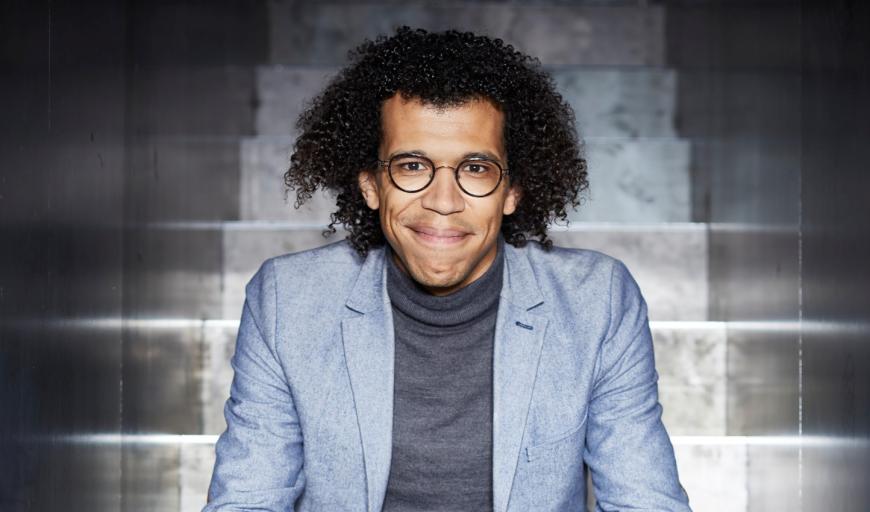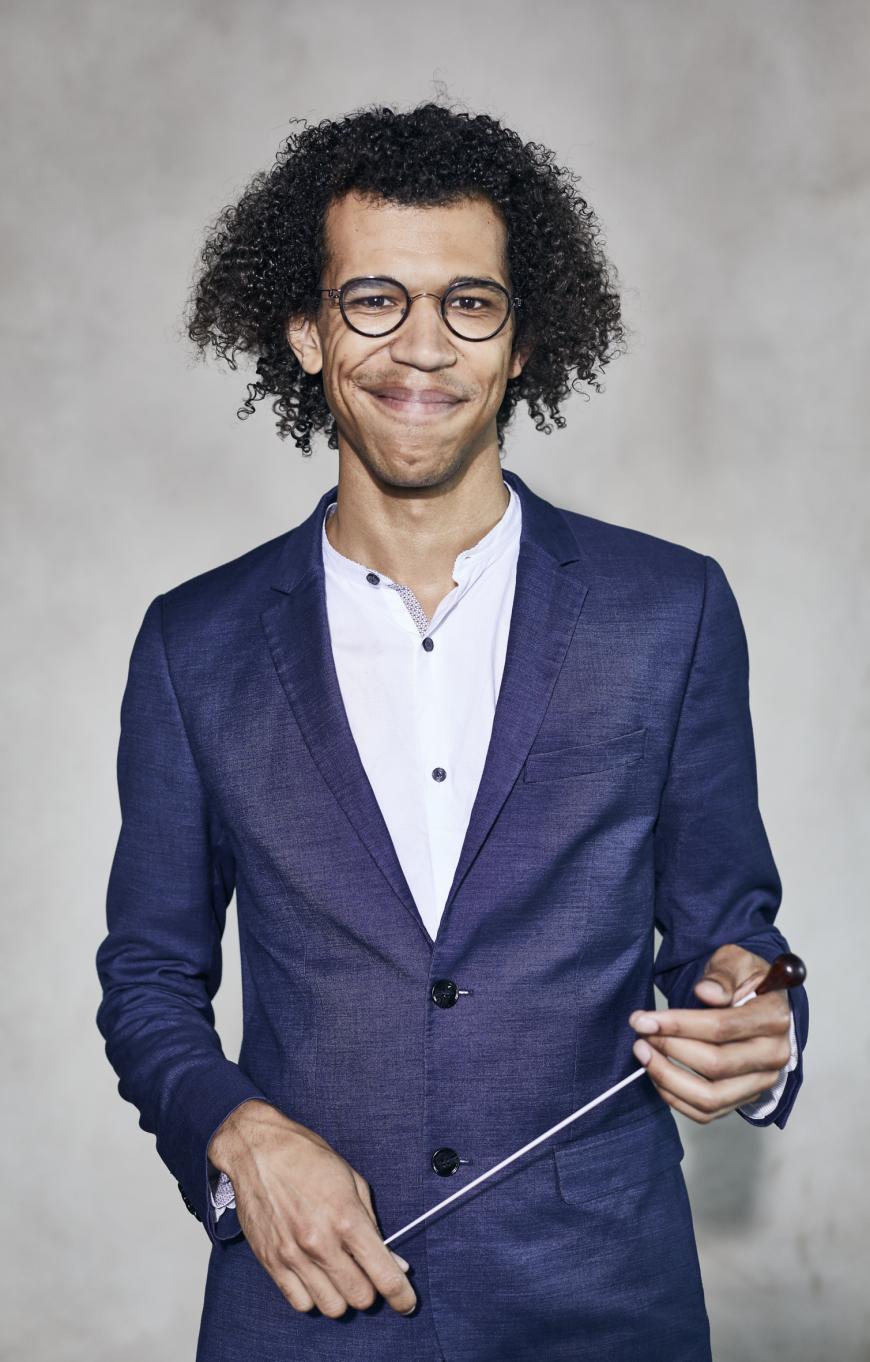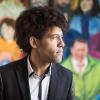
Not every eighth grader decides to become a conductor and then actually forges a career on the national and international scene. But that was the case with the Charleston, South Carolina-born Jonathon Heyward, who begins his five-year contract as music director of the Baltimore Symphony Orchestra next month, succeeding Marin Alsop. Heyward, who was born in 1992, will also be the first person of color to lead that ensemble in its 107-year history.
But before he mounts the podium in Baltimore’s Joseph Meyerhoff Symphony Hall, Heyward will make his debut at the Hollywood Bowl on Aug. 15 in a program of Lili Boulanger, Maurice Ravel, and Hector Berlioz. Heyward is no stranger to the Los Angeles Philharmonic; as a Dudamel Conducting Fellow, he stepped in at the last minute for an ailing Miguel Harth-Bedoya in 2017 to great acclaim.
Beginning his musical training on cello at age 10, Heyward picked up conducting while still in middle school, going on to study at the Boston Conservatory of Music. There, he became assistant conductor of the institution’s opera department and of Boston Opera Collaborative, receiving postgraduate lessons at London’s Royal Academy of Music. Named “One to Watch” on the Bloomberg 50 list in 2022 and a winner of the “Young Talent Award” from the 2020–2021 UK Critics’ Circle Music Awards, Heyward recently made his debut with the Detroit Symphony Orchestra.

Other recent guest conducting highlights include debuts and return appearances with the London Symphony, the London Philharmonic, and the Hallé in Manchester, as well as with the BBC National Orchestra of Wales and the Scottish Chamber Orchestra. Currently chief conductor of the Nordwestdeutsche Philharmonie, Heyward will leave that post at the end of the 2023–2024 season and will succeed Louis Langrée as music director of Lincoln Center’s Mostly Mozart Festival Orchestra, which will be renamed before Heyward raises his baton next year.
SF Classical Voice had a chance to catch up with the maestro from London, where he’s been living with his wife before the couple moves to Baltimore for his new gig.
While growing up on jazz, you also played the cello. Do you still have your Suzuki training book that Yo-Yo Ma signed for you in Charleston?
I definitely have my Suzuki book that he signed and have a few pictures of him as well. He was an inspiration to all of us in a lot of ways, [and] it’s been an amazing sort of journey [since] my time as a cellist.
How does an eighth grader know that he wants to be a conductor?
It all started in middle school. I had an eighth-grade music teacher who became ill, and he had a substitute teacher who was not a conductor, [but he] put students’ names in a hat, shuffled them all around, and picked a name for a person to conduct.
My name was picked, and I was terrified about being in front of my peers, but what I loved, and still love, is the essence of the score. How you see more than one line, one part, and become a part of this huge organism that is a symphony, that is an orchestra.
You’re going to debut at the iconic Hollywood Bowl. What are your thoughts on leading the LA Phil again and performing in an amphitheater that seats nearly 18,000 people?
It is an iconic place to make music. As a Dudamel Fellow, I was assisting several times at the Bowl, [so] I know the space and the atmosphere very, very well. I miss the musicians of the LA Phil, and it’s great to come back, and it’s wonderful to have[had a] tenure as a Dudamel Fellow. But what I’m really itching for is to be back with this fantastic orchestra.
You get scant rehearsal time, so how do you manage to have chemistry with the LA Phil, and what makes for good chemistry between a conductor and an orchestra?
Listening. As a conductor, you have to learn how to listen, to learn what the pace of the orchestra is. I remember feeling a sort of lovely chemistry when I did my first concert. It was a community concert that was free for 1,000 people, [and] it happened the week before I was invited to step in at the last minute for my subscription series debut. Then, I had little rehearsal, too, but it makes it very exciting to do a program with little rehearsal. You have to be right there from the start — listening.
Let’s talk about your Bowl program. You’ll be leading the band in Lili Boulanger’s D’un matin de printemps, Ravel’s Piano Concerto in G Major with Jean-Yves Thibaudet, and Berlioz’s beloved Symphonie fantastique. Have you worked with Thibaudet before, and how did you decide on these works?
No, I have never worked with him, but I remember vividly one of my very first musical experiences when I was a cellist. I was going to a Charleston concert and seeing him play, and I was so moved by his incredible interpretation. He’s always been a sort of childhood hero in a lot of ways; he has a beautiful sense of interpretation.
[Regarding the] program, I try to keep threads going, and this is very much a French program. I think the LA Phil has a gorgeous sensitivity to their ensemble playing that works well with the French, [so I was] focusing on how that could work. I always love to introduce or accompany a program with a piece — or a composer — that is lesser known, to kind of parallel what many may be used to hearing with something that people are hearing for the first time.

What, then, makes for a good program?
Making sure that there’s relevance to each piece and there’s a sort of through line. It should be well crafted, like a three- or four-course meal. It can’t be thrown together; you don’t want Italian with Japanese, with Mexican. You need continuity that sets you up for a successful evening. Being able to challenge everyone, myself, and the orchestra. You might program a warhorse that we’re used to hearing which is a voice of the past — which is also a privilege of mine and a huge responsibility — but [you should] also be able to pair it with voices of today.
Reviewing your debut with the New York Philharmonic in April, The New York Times’ Seth Colter Walls called you a “rising star.” What was it like making your debut there with less than two months’ notice?
I said to [then-NY Phil president and CEO] Deborah Borda when I arrived that I’m a bit of a daredevil when it comes to being invited. This was another example of a subscription series debut and [my] jumping in at the last minute. But going back to the orchestra, it was such an honor to be there to work with this amazing group in their new space, [David] Geffen Hall. I have no other words but that there’s a sense of collaboration that this ensemble has. I felt very, very lucky as an up-and-coming conductor to be able to collaborate with these high-class orchestras. I’m really honored to be a part of them.
Has Marin Alsop given you any tips as you begin your tenure with the Baltimore Symphony?
We’ve had a lot of discussions, and what I really appreciate so much about Marin is that she has an open-door policy. We are in frequent contact, which [has made it easier] to pass the baton, if you will, and get to know really what’s been happening with the BSO for several years as we venture into this new journey together.
On a similar note, what advice do you have for aspiring young conductors?
Everything you do should be a reflection of what the music is saying. I think in this industry it’s very easy to get caught up in various aspects of what the job is, but what I’ve found is [that] when you focus on the artistic integrity of what you’re presenting, interpreting, you can’t go wrong. I never could imagine that my career would get to this level — even five, six, or seven years ago.
When I first started to hold on to and keep focus of the love of what this art form can express and give to a community, [I realized that] this should be the utmost focus in what we do as conductors. In a way, you’re a storyteller to the audience. If you don’t feel that any of that resonates with you, maybe conducting isn’t what you should be doing. As a conductor, we have bigger responsibilities than being collaborators; we’re enablers to the musicians onstage. We’re telling a story with the audience.
Your Instagram handle is @converseconductor. Where does that come from?
That’s a funny story. One day I forgot my black shoes before conducting an educational concert, and I had my red [Converse] Chucks on and conducted [wearing them], and the response from the kids was amazing. I even got [business] cards with my red shoes. What it taught me was a huge lesson about breaking the fourth wall — that every little element does matter.




